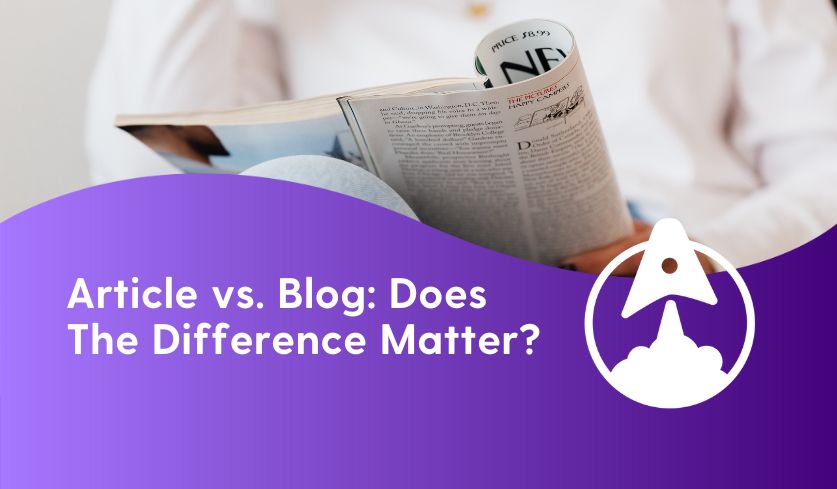Think about the last time you posted an article on your website. Maybe you shared it on social media with a caption along the lines of “check out our latest blog!” While you’d be far from the last person to use this fun call to action, it’s not always 100% accurate.
Surprising, right? It turns out that, in the article vs. blog lingo debate, there are meaningful differences. The confusion comes up because many blog posts include elements of articles but not quite the whole shebang. Below, we’ve defined and explained each term and filled you in on everything you should know.
What is a blog?
A blog is a company’s “web blog” — which, when you make it a portmanteau, becomes “blog.” You can thus think of writing a blog post as adding an entry to your journal, whether it’s your company’s log or personal reflections. These posts can fill in readers on your latest news and stories without, in some cases, getting too deep into information or concepts. This is why blogging is so key to keeping your audience engaged — it’s where you share what’s up with your business and who you are.
What is an article?
An article is an informational piece of content in which you present information and make (and support) claims. These claims may pertain to your industry, product, or service.
Since persuasion is the undercurrent of a great article, using logic and deductive reasoning matters more than telling a story or providing a short update. Your goal is to set up a premise and, through facts and well-backed ideas, guide your readers to a conclusion about the premise.
The differences between a blog and an article
The differences between blog posts and articles can be important to keep in mind for your content strategy. To that end, below, we’ve outlined four key differences between blogs and articles.
1. Where you publish it
Your blog lives on your website, and blog posts live on your blog. This is because blogs tell your story, so they should be attached to the same site where visitors can learn all about your offerings. It’s also because blog posts are key to your website ranking more highly on search engine result pages (SERPs). With these high-ranking posts come more exposure.
You can post articles on your blog too, though that’s just one spot for them. You can also arrange for them to be published on news websites — after all, articles are what you read in newspapers and magazines. Pitching these publications’ editors on letting you write for them can be a great way to share your argument with an especially large audience.
2. How much research and evidence you need
Blogs can be based on your personal opinions or your learned, experience-based expertise. This means they don’t require a ton of research — writing about what you know might give you all the backing you need.
Articles, on the other hand, are all about diligent, thorough research. They’re for making bold claims that you back up with evidence and facts. In an article, you’ll have the space to structure an argument through which you can make your boldest claims seem entirely reasonable and compelling.
3. How they’re perceived
In blogs, you have more room to be casual and informal, or a bit fun and upbeat like in a social media post. Your blog should almost read like an update a friend sent you that’s longer than usual but no less compelling. This way, your audience can get to know what you’re all about and really feel connected to you.
Articles are more professional and formal given their technical focus. They lack space for the fun quips or conversational language you can use in your blogs. You’ll instead focus on laying out your argument in a neutral, approachable manner.
4. Which point of view you use
Blogs are often written from a first-person point of view — “We’re excited to announce,” for example. This helps establish the more conversational tone for which blogs are known. Conversely, articles often use a third-person point of view to stay neutral — “Studies have shown,” for example. However, in some articles, “we” and “our” may be okay.
Article vs. blog comparison chart
| Blog | Article | |
| Published on | Company website | Multiple places, including company websites and publications |
| Research and evidence | Not always needed | Extensive and generally expected |
| Tone | Often associated with informal and casual | Often associated with formal and academic |
| Point of view | First-person, generally | Third-person, generally |
Is there a difference in word count between articles and blogs?
Yes, there’s a difference in article vs. blog word counts, but word count isn’t as important as succinctly, clearly making your points. Although many writers say that blogs should be at least 300 words, you may see much longer blog posts when the topic justifies it. On the other hand, most articles are longer by default.
Wait, so why do people use “blog” and “article” interchangeably if they’re so different?
Let’s be real here — nobody’s going to drag you through the mud if you share an article and call it a blog or vice versa. In fact, many blog posts share articles’ educational or informative intent, just without all the formalities. These posts may resemble articles if you made them as approachable as blogs. This mix — the casual language of blogs, the rich information of articles — is often exactly what customers seek when they conduct internet searches.
Here’s an example we love: The business phone service provider Nextiva has a blog post called “What is VoIP?” Toward the top, the writer quickly defines the term “VoIP,” which is basically Netxiva’s core service. The writer then devotes thousands more words to VoIP’s basic functioning, features, advantages, and other key user concerns.
This is exactly what a customer looking to understand business phone solutions might want to read. It’s nowhere close to as formal or dense as an article, but it’s more informative than a blog. It gives readers a surface-level technical rundown and keeps them engaged with casual language. It’s the best of both worlds.
How does SEO come into play?
SEO is why so many blogs have article-like qualities. A blog post detailing your latest company news can engage your current customers, but it doesn’t do as much for acquiring new customers. These potential customers might be searching the internet for terms related to your company, and blogs with article-like content best address these customers’ needs.
The Nextiva blog is, again, a perfect example. Because this content provides quality information, it appears high in search engine results pages (SERPs). This means Nextiva is capturing all kinds of leads — anyone interested in VoIP might find and choose them. That’s especially true when the content is strong, which, in this case, it very much is. When you need blogs this powerful, hiring content writing experts will be your best bet.
SCS Creative can write all your article-quality blogs
Blogs aren’t articles, but when they borrow some of articles’ winning qualities, they do wonders for your content strategy. We know this well — SCS Creative, led by an award-winning former journalist, regularly produces article-level blogs for a variety of clients. Our team’s research, writing, editing, and proofreading skills are so strong that our blogs massively increase our clients’ search engine rankings. In tandem, their impressions and number of ranking keywords skyrocket. That’s the power of folding article-like qualities into your blogging.
Contact SCS Creative today to drive your content strategy with article-like blogs. You’ll get more than high-quality copy — you’ll get the leads to show for it too.






